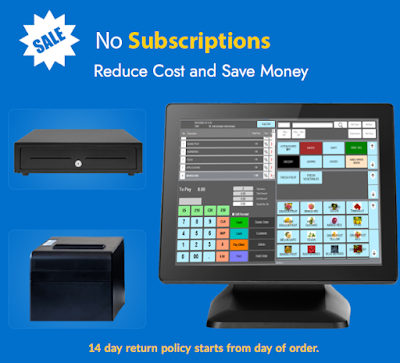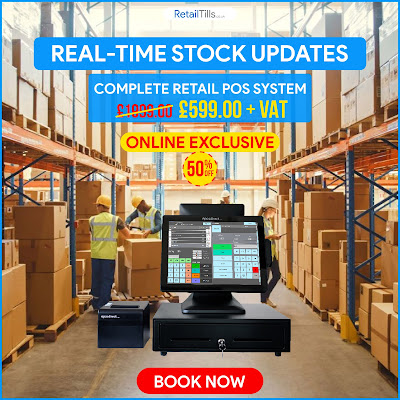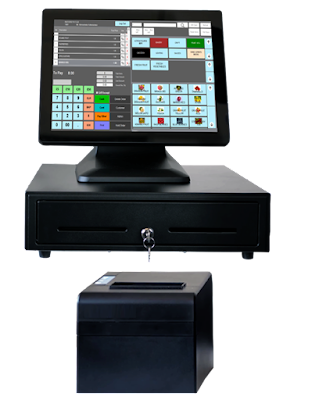In the modern world of retail business, technological advancements have revolutionized the way businesses operate, and perhaps one of the most transformative innovations is the modern retail till system in London. Often referred to as point-of-sale (POS) systems, these advanced tools have evolved from simple cash registers to complex, multi-faceted systems that play a pivotal role in every aspect of a retail operation. The modern retail till system is no longer just a device to process transactions; it has become a hub for customer interaction, inventory management, data analysis, and much more.
Streamlined
Transactions and Payment Processing
At its
core, a modern retail till system still performs the essential function of
processing transactions and managing payments. However, the capabilities of
these systems have expanded exponentially. Gone are the days of manual price
entry and calculation – modern retail tills are equipped with barcode scanners,
touch screens, and even integrated payment options like credit card terminals
and digital wallets. This streamlines the checkout process, reduces human
errors, and enhances the customer experience by making payments quick and
hassle-free.
Customer-Centric
Interaction
Retail
POS in London have
evolved beyond mere transaction processing; they now facilitate customer
interaction and engagement. Integrated customer relationship management (CRM)
features allow retailers to gather and store valuable customer data. This
information can be leveraged to create personalized shopping experiences,
offering targeted promotions, discounts, and loyalty rewards based on customer
preferences and purchase history. This personalized approach enhances customer
satisfaction and builds brand loyalty.
Additionally,
these systems often feature digital displays that can showcase product
information, advertisements, and even prompts for upselling or cross-selling.
Retailers can leverage these features to educate customers about products,
promote new arrivals, and increase sales.
Efficient
Inventory Management
Inventory
management is a critical aspect of retail operations, and the modern retail till system in the UK excels in this area. With integrated
inventory tracking, retailers can maintain real-time visibility into their
stock levels. This prevents stockouts, reduces overstocking, and optimizes the
replenishment process. As items are scanned during transactions, the system
automatically updates inventory levels, enabling retailers to make informed
decisions about restocking and purchasing.
Some
advanced systems even offer features like automated reordering, which helps
maintain optimal stock levels without manual intervention. This not only
improves operational efficiency but also contributes to better customer
satisfaction by ensuring that desired products are consistently available.
Data-Driven
Insights and Analytics
In today's
data-driven business landscape, the value of insights derived from sales and
customer data cannot be overstated. Modern retail POS system London gathers a wealth of information, ranging from sales trends
to customer preferences. Retailers can harness this data to identify
top-selling products, understand peak sales periods, and tailor their inventory
and marketing strategies accordingly.
Advanced
analytics tools integrated into these systems enable retailers to generate
comprehensive reports and dashboards. These reports provide actionable insights
that can drive strategic decision-making, such as identifying underperforming
products, evaluating the success of marketing campaigns, and optimizing pricing
strategies.
Seamless
Integration and Scalability
Retail
POS systems
are designed to be adaptable and scalable, catering to the needs of businesses
of all sizes. They offer seamless integration with other crucial systems, such
as accounting software, e-commerce platforms, and customer loyalty programs.
This integration ensures that data flows seamlessly across different aspects of
the business, reducing manual data entry and minimizing errors.
For
growing businesses, these till systems in the UK can
be easily scaled up to accommodate increasing transaction volumes and
additional store locations. Cloud-based solutions, in particular, offer the
advantage of centralized data storage and management, making it easier to
monitor and manage multiple outlets from a single interface.
Enhanced
Security and Compliance
Security
is a top priority in retail operations, and modern retail till systems have
responded with advanced security features. These retail epos systems in London incorporate encryption protocols to protect
sensitive customer payment information, helping retailers comply with industry
regulations.
Biometric
authentication, such as fingerprint scanning, has also been integrated into
some systems, adding an extra layer of security and reducing the risk of
unauthorized access. This is especially important as cyber threats continue to
evolve.
Conclusion
The retail EPOS system has come a long way from its humble beginnings as a
simple cash register. Today, it serves as the epicenter of retail operations,
offering a myriad of features that streamline transactions, enhance customer
engagement, optimize inventory management, provide invaluable data insights,
and ensure compliance with security standards. As technology continues to
evolve, the role of these systems will likely expand even further, reshaping
the retail landscape and enabling businesses to provide exceptional shopping
experiences in an increasingly competitive market.







